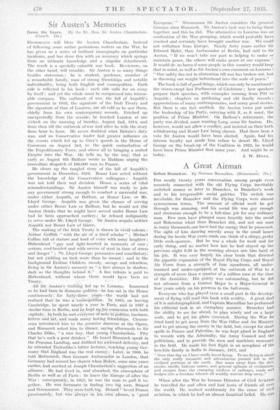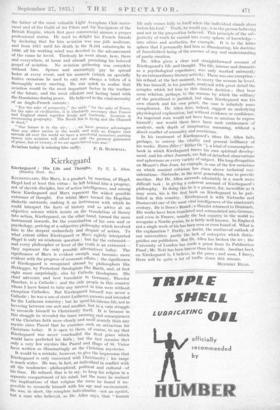A Great Airman
remotely connected with the old Flying Corps inevitably switched sooner or later to Brancker, to Brancker's work and to his irrepressible social gaieties. The 'switch was inevitable, for Brancker and the Flying' Corps were almost synonymous terms. The amount' of official work he got
through was, amazing, and his social life was gay enough and strenuous enough to be a full-time job for any ordinary man. Few men have plunged more heartily into the social
and Bohemian whirl than Braneker did, and not one man in many thousands can' have had the energy that he possessed. The sight of him dancing merrily away in the small hours during the hectic War years made one think of a chirpy, perky little cock-sparrow. But he was a whale for work and for early rising, and no matter how late he had stayed up the previous night 9.80 in the morning always saw him hard at his job. It was very largely his clear brain that directed the gigantic expansion of the Royal Flying Corps and Royal Air Force from a strength of four squadrons, all under- manned and under-equipped, at the outbreak of War to a strength of more than a quarter of a million men at the time of the Armiitice. His gaiety was outstanding, but he did not advance from, a Gunner Major to a Major-General in four years solely on his prowess in the ball-room.
Everyone who has played even a small part in the develop- ment, of flying will read this book with avidity. A great deal
of it is autobiographical, and Captain Macmillan has performed his editorial task in an exemplary manner. Braneker had
the ability to see far ahead, to plan wisely and on a large scale, and to get his plans executed. During the War he tried hard to get away from the War Office and Air Ministry and to get among the enemy in the field, but, except for short spells in France and Palestine, he was kept glued in England to wrestle with the Admiralty, the Army Council and the politicians, and to provide the nien and machines necessary in the field. He made his first flight in an aeroplane of the box-kite family' in India in January, 1911, and " from that day on I have really loved flying. To ;lie flying is about the only really romantic and adventurous pursuit left in the civilised portions of the earth. One soars away from the dirt, smoke, smells, hideous noises, and general ugliness of civilisation, and escapes from the cramping confines of railways, roads and hedges into a freedom whence all worldly worries drop away."
When after the War lie became Director of Civil Aviation he travelled far and often and had hosts of friends all over the world. He worked assiduously for the cause of civil aviation, in which lie had an almost fanatical belief. He was the father of the Most valuable Light Aeroplane Club move- ment and of the Guild of Air Pilots and Air Navigators of the British Empire, which first gave commercial airmen a proper
professional status. He used to delight his French friends by declaring that for him aviation was une folk maftresse, and from 1911 until his death in the R.101 catastrophe in 1930, all his working mind was devoted to the advancement
of the cause he loved. Tirelessly he went about, here, there and everywhere, at home and abroad, preaching his beloved gospel of aviation. No aviation gathering was complete without him. Spruce and unceasingly gay lie spread lustre at every event, and his monocle (which on specially
festive occasions he used to eat) was always a token of a thoroughly merry meeting. He was quick to realise that aviation would be the most important factor in the warfare
of the future, and the most efficient and lasting bond with the Dominions during peace. He believed in the vital necessity of an Anglo-French entente : " For the sake of prosperity," (ho said) " for the sako of Peace, for the sake of civilisation, it is absolutely necessary that France and England stand together firmly and fearlessly. Aviation is overturning geography. Tho North Sea is dying and the Channel is dead."
" Our future is in the air ; we have greater advantages than any other nation in the world, and with an Empire that spreads all over the world we have a wonderful incentive; putting money into aviation will afford not only the greatest guarantee of peace, but of victory, if we are again forced into war."
Aviation today is missing him sadly. P. R. BURCHALL.















































 Previous page
Previous page